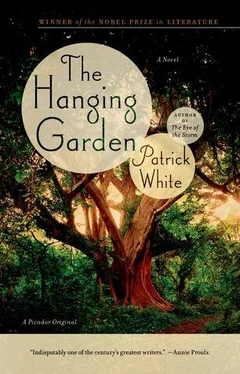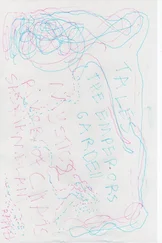Gil left his former guardians and the person who was to be his keeper, to exchange the necessary information most of which would be uninteresting if not unbelievable. Already the faces of the other boys his forced companions of so many weeks were closing against one another as a fresh phase of life swallowed them up. So he went and stood on the edge of the pier, on the edge of the harbour, which by now was a sheet of silver that was stitched with details of gulls’ wings. There was a smell of weed and shellfish rising as the sea sucked at slimy woodwork underpinning the world of human traffic.
* * *
They were crossing the ghost of a great bridge.
‘You should see us in better times,’ she told him. ‘This is the brown-out — for the war.’
He shivered slightly as they bowled along side by side in the taxi.
‘Cold, are you? Well, it’s winter here. You’ll soon get used to everything seeming topsy turvy.’
In fact he felt hot in his English flannel but there was no need to tell her, and soon they were burrowing into the closed fug of the house she had brought him to. He shivered worse than ever.
‘This is your new house,’ she told him.
His room was larger than any he had ever slept in, furnished with oddments and two narrow beds, one of them made up, the other with a naked mattress on it, as close to opposing walls as they could get. The room, he soon realised, was not his. It belonged to an enlarged, near lifesized photograph.
‘My husband,’ she explained needlessly. She had talked about him all the way across.
Knowing his dead host by heart he no more than glanced at the photograph.
‘I have some fish fillets for your tea,’ she told him while poking at a pan from which a blue smoke was rising. ‘What’s your favourite fish, Gilbert?’
‘Soft-shelled crabs…’ It was more a murmured memory than a reply to her question.
‘Never heard of ’em,’ she said firmly, and poked harder at the pan she was tending. ‘I hope you’re not difficult about your food — not a finicky boy, Gilbert. Mr Bulpit went for plaice and chips when he was at Home.’
Via the warrant officer, she got back to ‘the Colonel’ and ‘Your dear Mother — to who I was devoted — way back from our Indian days — such a thoughtful lady.’
After the fish fillets they really got down to business, at a cane table with brass ashtrays on the kitchen’s fringe. Lahore, Poona, Simla, Bangalore, Bombay — all the old Indian names were trotted out, like the echoes from a snapshot album in Kensington. He closed down while she carried on.
There was the pub he had heard about in the taxi.
‘Mind you, I don’t take to public houses, and never ever played any part except I was there if a lady was needed to smooth things over. Some of those barmaids. Reg — Mr Bulpit — fancied a public — and made a success of the old Imperial , then dropped dead — in that same basket chair where you’re sitting — while enjoying ’is evenin’ cup of Darjeeling.’
She was steaming from resentment rather than grief, for something that had been done to her.
Gil shifted in the dead man’s chair and made it creak. ‘Why was the clergyman’s wife wearing a safety pin in her collar?’ Mrs Bulpit suddenly asked.
‘Had to keep it together, I suppose.’
He said he would go to bed. The photo-portrait had been hung in such a way that it leaned outward from the wall and threatened to crush any usurper with its vast slab of compressed meat.
* * *
Several of the boys were Lockharts and there were others too small to be at school. Lockharts took him down to the lower end of the yard where tree roots had lifted up the asphalt. They asked him what he had come here for. He couldn’t help it, he was sent, he said. They didn’t want a lot of Poms. He pointed out that he was only one. He talked like a girl, the oldest Lockhart jeered. He hit out at the Lockhart face, which began to jigger and blink as if standing on a fixed spring. Then the lot of them went into action. They rubbed his face in the asphalt where the tree roots had lifted it up.
The bell rang for school, or what might have been the end of a round and they all marched up towards the classrooms past trees dripping blood from their armpit-hair.
Ma Bulpit said, ‘You’ll find it hard till you know the ropes. Those Lockharts … Australians mean well.’
She brought iodine — white, never used anything but. For one dressed permanently in black, she seemed to find peculiar virtues in white — in addition to iodine, port and rum (‘Mind you, I’m not a drinker, it’s only sociable to join in.’)
As she dabbed, the fire shot through his shin and into his eyes. He wasn’t crying, only watering.
* * *
She broke the news one Sunday morning in the voice they put on to persuade you to swallow your codliver oil or hold out your arm for a poultice, a quick bright threat on this bright morning.
‘You’ll soon have company,’ she said, ‘in the house.’
As if he didn’t have enough at school. The house was his.
‘A little girl about your own age.’
Ma Bulpit went off into a voice to persuade you the codliver oil was over, the poultice not burning into your flesh. School was better and wasn’t all that bad since they went behind the boys’ dunny to compare him and Bruce Lockhart, and squeezed each other’s muscles.
‘Irene’s mother is Mrs Lockhart’s sister,’ Mrs Bulpit was sweetening the pill.
‘Why don’t she go to Lockharts?’
‘We mustn’t forget our grammar, Gilbert, Colonel Horsfall wouldn’t like that. Boys of the educated class don’t say “don’t” but “doesn’t”.’
‘Well, why doesn’t she?’
‘People have their reasons,’ Mrs Bulpit said, in her voice a mystery remote from the glistening white dishes she was rinsing. ‘Irene,’ she added, making it extra English, ‘has a Greek father — or had, he died.’ She sucked her teeth, perhaps remembering ‘Your dear mother,’ or because death is something nice people don’t talk about. ‘Anyway, we must all be kind to little Irene. I’m not all that gone on foreigners, but she’s a human being, isn’t she?’
As he watched Mrs Bulpit drying one of her lustrous plates, he suspected this Irene might turn out black. He had never met a Greek. Her colour worried him less than her trespass on his territory. As for her being foreign, weren’t the Lockharts, Mrs Bulpit, his own father and mother, everyone he could think of except himself and his friend Nigel Brown, who had died of a bomb.
As he dawdled up the path on the evening of this intruder’s arrival, it was the threat to his innermost life which made him go slower still, not her foreignness, her Greekness, her blackness, but the fact that she might skip down this same path staking a claim to this or that, the sea wall with the writing on it, the little figs (which weren’t figs at all) fallen from the dark old trees (the fig things were his to crush if he wanted and did crush hurtfully) any part of the garden which rejected even the midday light, she would come ferreting out the smells which he knew by heart in the undergrowth, laying claim for sure to the broken statue lying with her legs apart in fern, her tits palpitating with what looked like cut-outs of yellow rubber, her head had gone, he had never found it. Would this ferreting girl? He ran some way off the path kicking out, as he always did, against the Wandering Jew and variegated or plain ivy, till he itched and sneezed, and stubbed his toes, not on the head which was rightfully his, but stones and half-rotted roots, to forestall this marauding girl.
Finding nothing he returned to the path, to dawdle slower, offering himself to mosquitoes which were soon pricking, sucking at his ankles; Gil arrived just below the invaded house on the cliff’s edge. He drew himself up into what must be the oldest tree in his threatened garden, so old its limbs were tormented, its muscles knotted, its armpit-hair thickened by moisture and colours of mosses, at the point where the trunk branched he had once seen the moon in the rain and dew collected there. When he had dragged himself up into his refuge, he leaned there panting, waiting for Ma Bulpit’s voice to jangle with his heartbeats. ‘Gilbert? She is here. Waiting.’ Then a pause before greater cunning, ‘If you don’t come quick we’ll have eaten up everything I’ve got for our tea.’ He listened to the contracted silence, but nothing broke it, except the squeaking of an early bat.
Читать дальше












